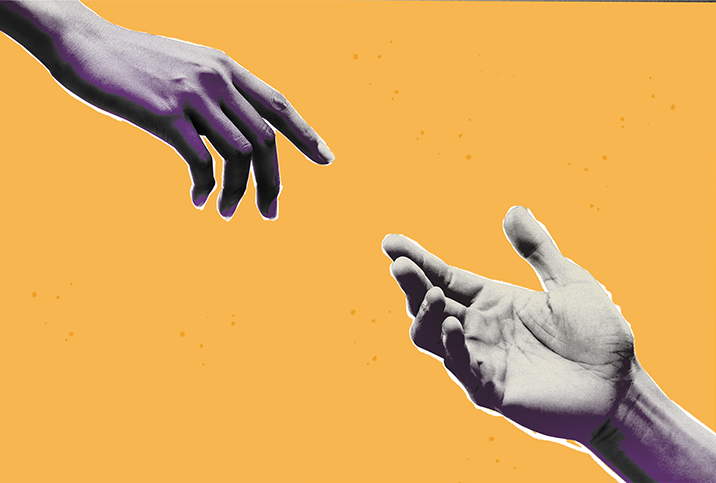Empathy and Sympathy in Your Intimate Relationships

All relationships require hard work. The more intimate the relationship, the more emotional energy we invest and the greater the need to be understanding of not only ourselves but our partner.
Two words that may come to mind when you refer to your feelings in an intimate relationship are "empathy" and "sympathy." These words are close in meaning but subtly different. Lately, empathy has been the preferred word in both popular culture and with relationship experts.
The differences between empathy and sympathy
The word sympathy is much older than empathy in creation and use. The first noted use of sympathy dates back to the late 1500s, derived from the Latin word sympathia, which means "community of feeling." In this context, we relate to another person's emotions through similar experiences. We have sympathy for a person's grief because we, too, have experienced loss in our own lives, for example.
Empathy is a newer word on the dictionary block. The word was first used in the early 20th century. It's a rough translation of the German word "Einfühlung," meaning "in feeling," coined in 1858 by German philosopher Rudolf Lotze.
"I've noticed over the last five or 10 years that people are using empathy now where it was never used before," said David Howe, emeritus professor in the School of Social Work at the University of East Anglia in the United Kingdom. "It seems to be everywhere these days and, of course, I think people conflate empathy and sympathy. When people say they have empathy for [someone], I think they generally mean they are sympathetic to the other person.
Empathy is 'you' oriented, whereas sympathy is 'me' oriented.
"Empathy is a bit more active than sympathy, whereas sympathy is simply sensing that, 'Gosh, I've had a similar experience. Yeah, it was difficult for me too,' [and] making some connections. What it fails to do is tune in and get into the mind state of the other person," Howe said.
Sympathy, because it relies on our own feelings, can interfere with our understanding of the other person's circumstances, he added. Empathy goes beyond relating to another's feelings by attempting to understand the other's needs being communicated cognitively and intellectually, said Howe, the author of "Empathy: What It Is and Why It Matters."
In the original German usage by the German art community of the early 1900s, empathy was an attempt to understand art from the inside, he said.
"This is my understanding of empathy: an attempt to get inside of an experience, which is not easy. It does require effort. Empathy is 'you' oriented, whereas sympathy is 'me' oriented," Howe said.
Empathy's role in our most intimate relationships
Understanding our partner's needs relies on more than just being present in a conversation.
"In many cases, we know what kind of help or support—advice, encouragement, cooperation, affection, validation—we need," said William Ickes, a professor of psychology at the University of Texas at Arlington and a researcher on spouses' support interactions. "We can either ask for it directly or offer hints and hope that our partner perceives our intent. When we know what we need and we ask for it directly, most partners, even non-empathic ones, will understand what we need and attempt to help meet that need."
Ickes further explained that sometimes we may offer a partner only "hints" when we do not know or can't articulate our needs. In these circumstances, "only the more empathic partners are likely to respond in a way that will satisfy us," he said.
Empathy and understanding your partner's hints or having them understand yours are good traits. But what Ickes and research partner Jeffry Simpson uncovered is that empathic accuracy has limitations.
"As Simpson and I have argued, accurately inferring our partner's thoughts and feelings is typically a good thing because it helps us achieve a better understanding of our partner that can result in increased closeness," Ickes explained.
"There is an important exception to that general rule, however," he cautioned. "When we infer thoughts and feelings our partner has [that] threatened our relationship, greater empathic accuracy can increase our feelings of personal distress. For example, [if we think our partner is] attracted to someone else or has contempt for us, [our inferences can] reduce our feelings of closeness to our partner and destabilize our relationship."
Ickes' advice is simple and particularly important when you and your partner are experiencing conflict.
"First, pay attention to what your partner says and to how they say it," he said. "In general, our partner's verbal cues are more important to our empathic accuracy than their nonverbal cues, as many studies have shown. Second, try to get outside your own perspective and do your best to adopt your partner's perspective instead."
More empathy, please
As children, we are usually taught empathy by primary caregivers. They often model empathetic relationships for us, teaching and showing us how the world is a social and psychological place.
With interactive play and conversations, children learn how to interpret verbal cues, facial expressions and body language. They begin to understand how people experience events and feelings, which helps them establish relationships.
"All species living in groups, like humans, have the ability to work cooperatively and collaboratively," Howe explained. "This requires some degree of recognition of the other person's perspective."
He said we need to recognize that individuals may not all bring the same point of view and may have different backgrounds. The more different we are from another person, the more difficult it is to feel empathy and the more effort it requires to be cognitively aware and build healthy relationships.
The more different we are from another person, the more difficult it is to feel empathy and the more effort it requires to be cognitively aware and build healthy relationships.
"In the U.K., there's increasing emphasis on education being instrumental for job success," Howe said. "However, understanding interpersonal behavior is key to social success. Music and drama are wonderful vehicles for this because they are performed collectively or with roleplaying activities. Reading good-quality literature requires [us] to understand the characters and their life situations, and that's another way we can learn to be more empathetic.
"We are an emotional species, and delving into these interests are quintessential to understanding our human condition," he continued.
Howe described the arts as an attempt to understand our own experiences from an internal perspective and then to externalize and communicate the experiences to the world. Our goal should be to recognize that the world won't work if it is just driven by instruments of the intellectual and the technical. Relationships, especially our most intimate ones, become "more problematic and more brittle" when we can't fully empathize with loved ones, he said.
Successful intimate relationships have an element of working toward empathy. When we are able to see our partners as individuals and accept their perspectives, we are allowing them and ourselves the potential to grow and love more fully.
Being aware, reflecting on thoughts and actions, listening to our partners and observing their verbal and nonverbal cues are all bridges to becoming more empathetic.




















